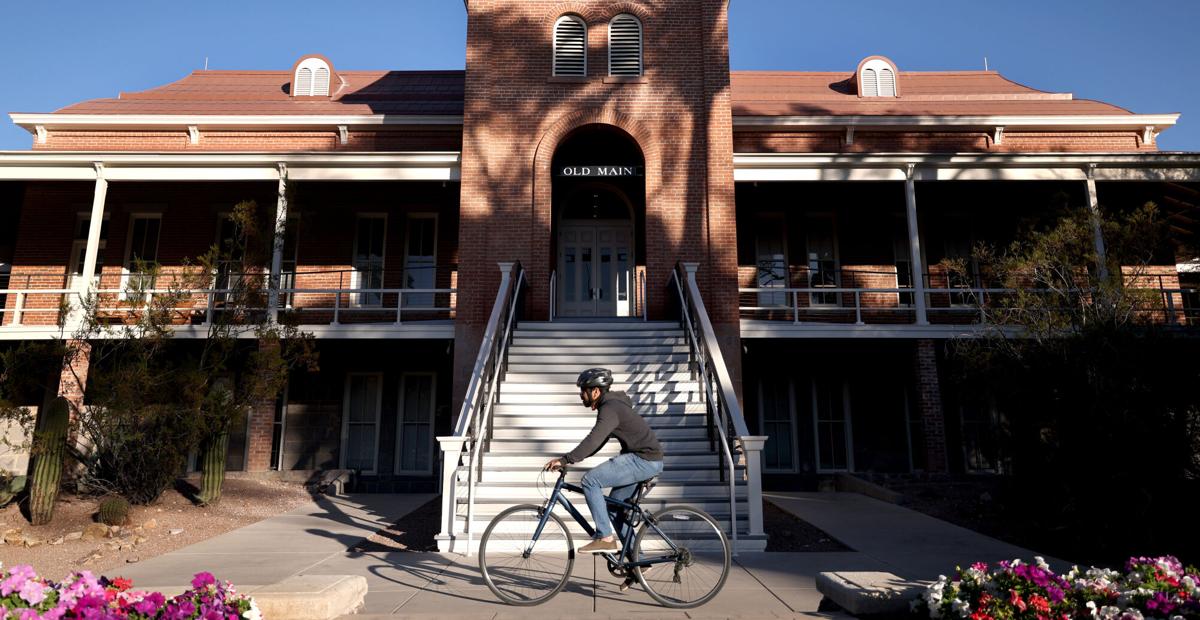University of Arizona faculty senators voted to table a resolution condemning antisemitism and Islamophobia, with some saying it was contradictory because it targeted hate speech while also reaffirming First Amendment rights to free speech.
The resolution was spearheaded by Faculty Senate Chair Leila Hudson and went through nearly six months of delays. “I was surprised with both the motion to table and that it passed,” Hudson said after Monday’s vote.
The draft resolution, initially promised by Hudson after a UA Jewish fraternity was vandalized in April, was first pushed to May. However, since May was the height of pro-Palestinian protests at the UA, including one encampment broken up by law enforcement officers, Hudson had said she couldn’t submit the resolution then “in good conscience.”
The first draft, titled “Resolution Involving Speech: Rights and Responsibilities,” was presented by Hudson at the Oct. 7 Faculty Senate meeting on the one-year anniversary of the Hamas attack on Israel that led to war in Gaza.
The final draft, presented Nov. 4, contained three paragraphs, beginning: “The Faculty Senate of the University of Arizona is dedicated to nonviolently combatting all forms of identity-based targeting, harassment, intimidation, supremacism, and discrimination on our campus, specifically including but not limited to antisemitic, anti-Jewish, Islamophobic, and anti-Palestinian threats, silencing, incitement to violence, or breach of the peace.”
“… the Faculty Senate emphasizes and reaffirms that the exercise of Constitutionally protected First Amendment rights to freedom from/of religion, freedom of speech, freedom of assembly, freedom of the press, and freedom to petition shall not be infringed upon by our public state institution or its agents,” it said. “The Faculty Senate endorses the principle that the solution to disagreement is more speech, not less, and the Faculty Senate encourages a culture of vibrant civil discourse and lively debate.”
During her presentation at Monday’s meeting, Hudson acknowledged that while the resolution was “symbolic,” there were “fears out there that it could be weaponized.” “But as we enter into uncharted territories with the potential of turbulence, both domestic and continued on the international and even planetary scale, I think it’s important to clarify the Senate’s position on free speech, but also on behavior that harasses people based on their identity,” she said.
The resolution was met with different voices of support and resistance, with some senators calling it “contradictory” and dealing with a “sensitive issue,” while others called it a “a meaningful statement” and “courageous.”
“First part, this body is not an investigative body. It cannot determine whether an accusation of hate speech is correct or not. That’s for other bodies, faculty bodies,” said Faculty Sen. Marlys Witte.
Witte said it was contradictory in a way to have the hate speech preamble, followed by “yes, we want to protect all speech and more speech and so on.”
Sen. Johann Rafelski suggested they vote on the beginning phrases of the resolution, saying he sympathized with the proposal to some degree but was also worried on the same grounds. “This is a very sensitive issue, so maybe we should actually have a committee discussing (it), because it has so many complications which arise to the right and left, and I can’t find my own position very easily,” Rafelski said.
Sen. Suzanne Eckert came in with a different view, supporting the resolution. “If we as a Senate are not willing to speak out and make a statement that is non-binding about freedom of speech and hate speech, then how can we expect other faculty members throughout campus to feel that we are united as a body, and to allow them to feel that they are able to speak out?” Eckert asked. “I would argue that this is a meaningful statement.”
Sen. Lucy Ziurys told Hudson she supported the second two paragraphs but the first needed work. Ziurys also said it was necessary to include other marginalized communities such as women and gays if they were talking about people being discriminated against. “It focuses on one set of groups, and you know, it needs to be a little bit more inclusive.”
Sen. Russell Witte said the resolution was missing a fourth paragraph related to the important aspect of censorship. “I think the first paragraph doesn’t go far enough in the sense that, I’m against all harmful speech. And so, to separate and identify what type of speech we want to focus on raises a question,” said Witte.
“I think one of our greatest problems right now in free speech is that we’re not allowed to say what we want. … And so this really requires a much larger discussion about the First Amendment,” he said.
He made a motion to table the resolution, which passed with 31 “yes” votes to 21 “no” votes.
After the meeting, Hudson told the Arizona Daily Star she thought the discussion was excellent and “a substantive and thoughtful set of contributions.”
“But it tells me that the sanctity of free speech, which I did absolutely try and address and incorporate in the motion, is primary on people’s minds,” she said. “So, I guess that the majority did not share the sense of urgency I feel about domestic and global events,” which she said she thought would make it appropriate to specify protections against harassment and violence.
Hudson said the resolution will “come back again in some form or fashion in the new year.”
“The important thing to get on the table is that constitutional protections are paramount in our community, but that we will also try to express our values of inclusion” and against hatred, she said.
Mitch Zak, a UA spokesman, said later that the administration’s perspective is this: “The university promotes open and civil discussion, the exchange of diverse viewpoints, and opposes discrimination of any kind. This kind of free expression will happen on all kinds of subjects, including geopolitical events, elections, and other important issues.”
Get your morning recap of today's local news and read the full stories here: tucne.ws/morning





